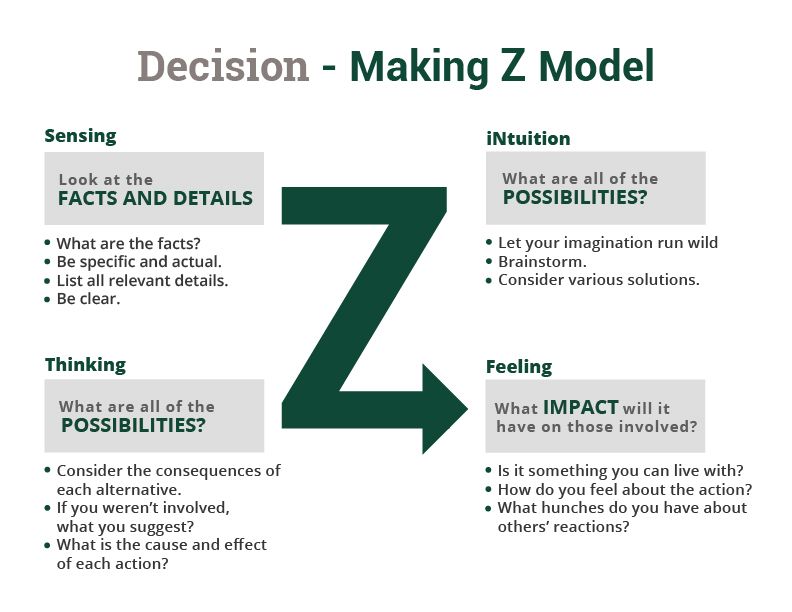Applying Personality Quiz Results
I’m finding this course pretty interesting.
They asked us to reflect on some of our results from a personality quiz - the one at 16personalities.com. I got an INFJ, but normally I’m INTJ and think I probably still am, really.
How will we apply what we know about our personalities to our interactions with our teams?
I’ll try to be more conscious about how I react to “perceiving” teammates. They may wait a while and not set a plan - that can be ok. It often feels wrong to me, though, in large part because it’s not how I’ve learned to work. As reflected by my personality.
I’ll consider strategies for myself in maintaining energy, even when putting the extrovert face on for the day.
And - I’ll try to carefully employ the decision-making z-model. This was something that really resonated with me today.

The decision-making Z model
I’ve found that Sensing vs Intuition, and Thinking vs Feeling, are the personality traits I feel least tied to/divided between. I have experienced myself flowing/adapting between the different personality traits, especially extrovert vs introvert. I know that I can do that as necessary for a situation… I hadn’t thought about steering my thinking through these middle traits though, and that’s what this decision-making model advocates.
In order - get the facts that you have straight, consider the problem more broadly especially in light of the facts, consider the concrete consequences of the different decisions you might make, and then finally consider the impacts of those decisions on people involved.
I value the thinking aspect more than the feeling aspect, in decision-making… But honestly - my decision-making often has little consequence for people, especially in the larger picture. Still, I think it’s notable and important that the feeling piece is the last step. It’s human nature to weight heaviest the first and last things you consider. In a civilization I truly believe there is almost nothing that matters more than the people in that society - perhaps this is very western-world thinking, but I mean this in the individual and collective senses. And I believe that the long-term view and outcomes for the individual and collective are the most important results to focus on…
Those “feeling” parts of the impact consideration generally invade my “thinking” considerations parts too, then, because I place importance on those long-term individual and societal outcomes. But, for all the times I fail to consider them, the z-model says to place your final consideration on the “feeling” impacts.